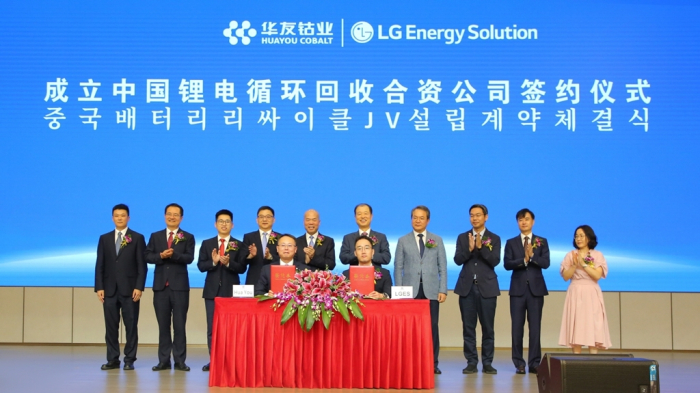LG Energy Solution Ltd., the world’s No. 2 battery maker, and Zhejiang Huayou Cobalt Co., the global refined cobalt leader, have launched a cell recycling joint venture for a stable supply of raw materials in the world’s largest electric vehicle market.
LG Energy and Huayou on Monday inked a deal to establish the JV, the first alliance between a South Korean and a Chinese company on the mainland for the business. The JV is set to extract nickel, cobalt and lithium -- key minerals used to make lithium-ion batteries for EVs – from used cells and scraps.
“It is essential to set up a virtuous resource cycle that manages the entire battery lifespan for a sustainable and stable battery supply chain,” LG Energy said on Tuesday in a statement. “Cooperation with Huayou Cobalt is expected to further strengthen customer value capabilities in the recycling sector based on sustainable resources.”
The two companies agreed to strengthen their strategic partnership and further their expand cooperation in the battery recycling business.
TO BEGIN OPERATIONS AT END-2024LG Energy and Huayou plan to start building two factories this year with a target of operations from end-2024.
They will establish the so-called pre-treatment plant that processes scraps, a byproduct produced from manufacturing batteries, in Nanjing where LG Energy runs a production facility. The other plant, a back-end factory that processes recycled metal, will be constructed in Quzhou, western Zhejiang, where Huayou has its operations.
The metal from the plants will be supplied to LG Energy’s factory in Nanjing through the cathode production process.
LG Energy has yet to unveil financial details on the JV,
on which they agreed in July 2022, such as values and stakes, citing a non-disclosure agreement.
The cooperation is predicted to allow LG Energy to stably procure raw materials while helping Huayou increase recycling volumes and secure a long-term customer for economies of scale and business expansion.
LG Energy has been seeking new growth opportunities in the battery recycling and reuse sector in cooperation with its competitive partners. It will collaborate with other global major companies across all value chains at key production bases in the US, Poland and Asia by 2027 for sustainable growth.
Write to Sungsu Bae at
baebae@hankyung.com Jongwoo Cheon edited this article.



